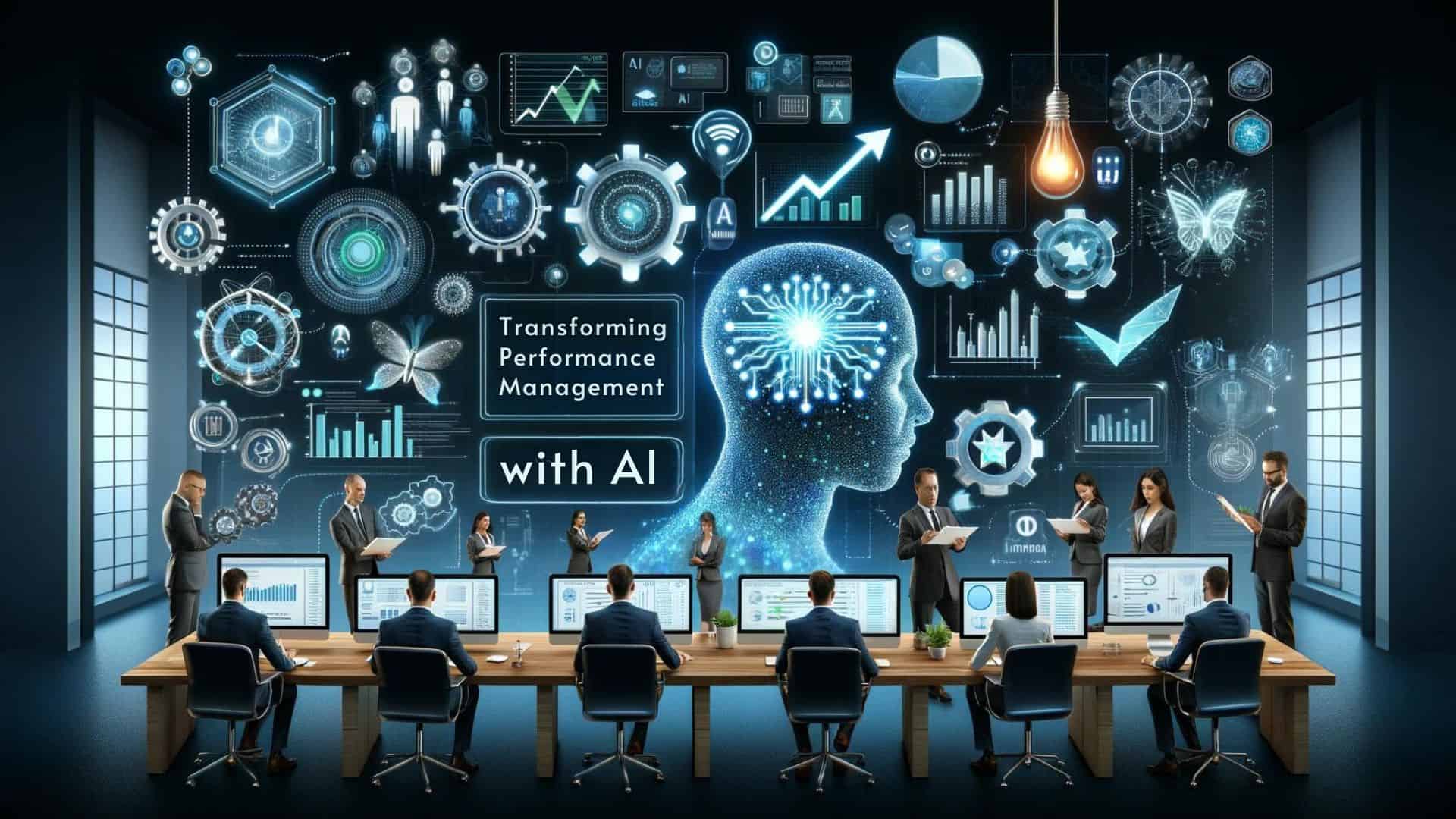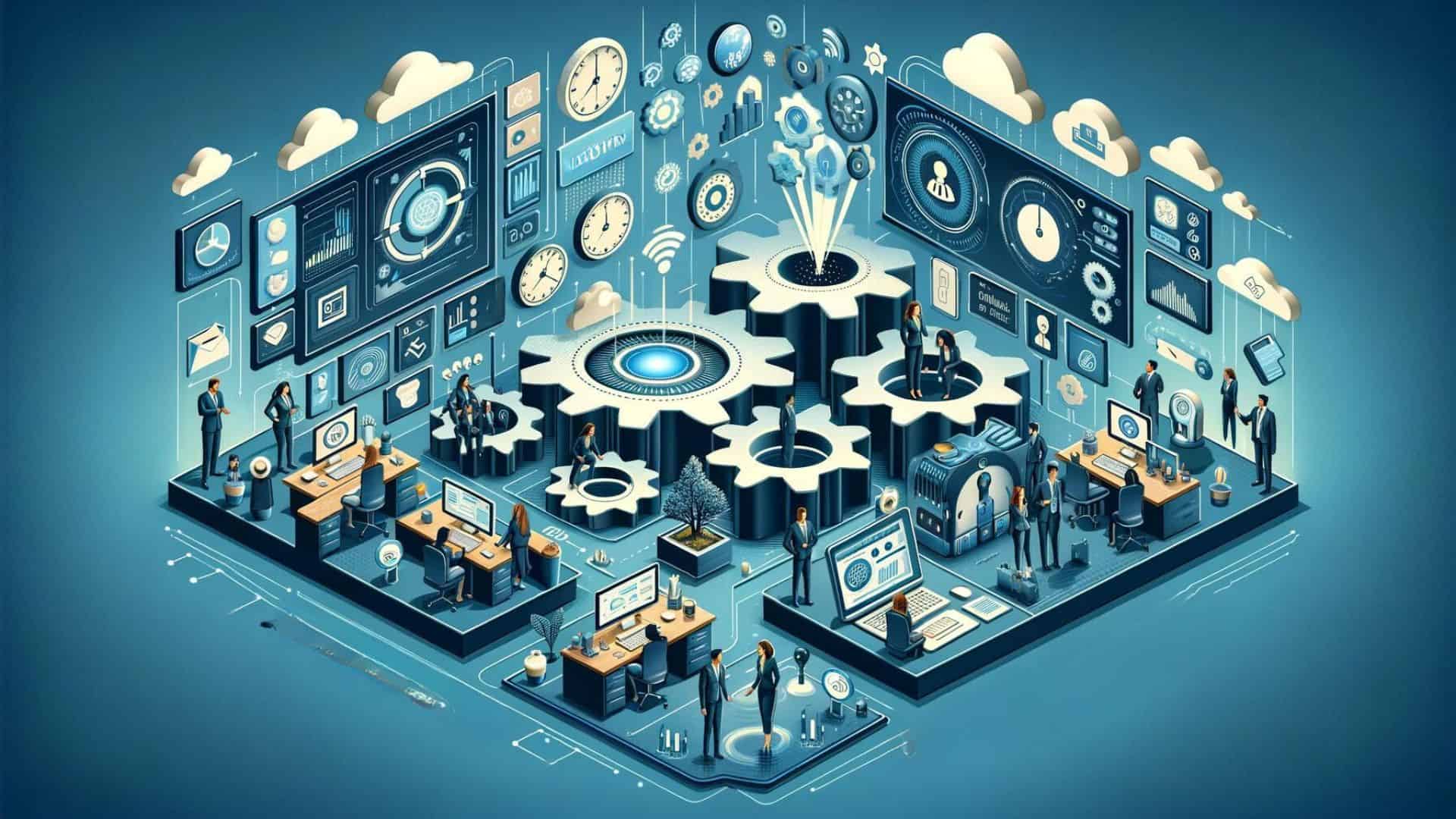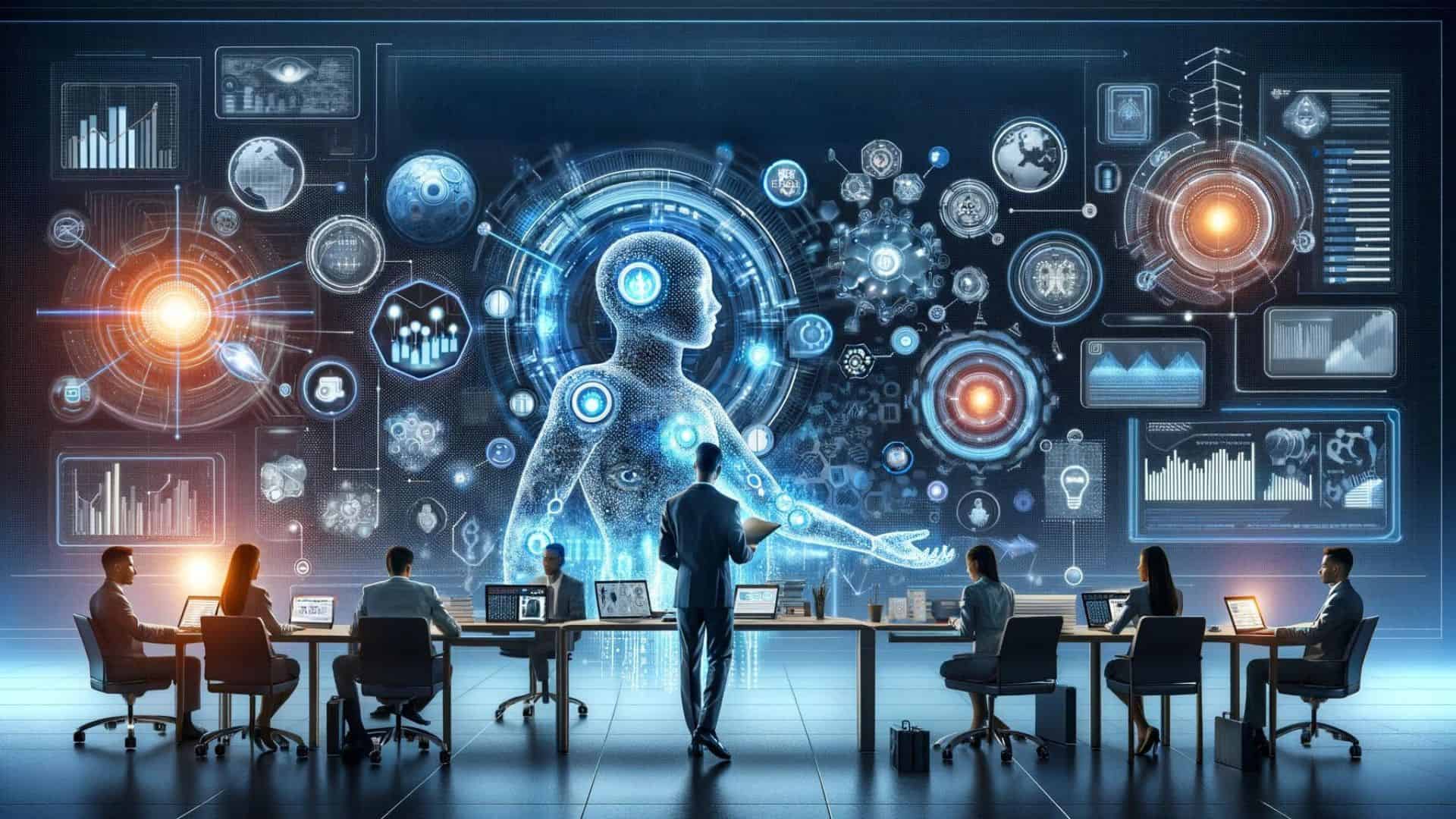Automating HR processes in small and medium-sized enterprises (SMEs) can be challenging within the intricate landscape of Human Resource management. Amid the struggle to retain top talent and streamline HR processes, the need for a comprehensive, user-friendly HR solution becomes vital. Enter AI HRMS, a cloud-based Human Resource Management Software specifically designed to combat HR-related challenges. Its functionalities extend from automating employee onboarding and maintaining wellness programs to managing leaves, claims, and performance reviews. The platform’s simple design promises efficiency, while its customizable features offer adaptability to meet individual business needs. As it continues to evolve with new features, AI HRMS aims not only to transform the way SMEs approach HR management but also to offer an affordable solution on the global stage.
Key Takeaways
- AI HRMS revolutionizes recruitment by automating sourcing, screening, and interview scheduling, enhancing efficiency and accuracy in talent acquisition.
- The software streamlines onboarding and engagement, offering AI-driven processes, continuous learning modules, and wellness programs to boost employee morale.
- Performance management is transformed through real-time feedback, AI-assisted goal setting and tracking, and mobile-friendly assessments, fostering a culture of continuous improvement.
- Routine HR operations are automated, simplifying leave and claims management, talent acquisition, retention, and establishing efficient automated workflows.
- Future-proofing HR strategy with AI involves strategic planning for integration, monitoring AI tools for continuous improvement, and adhering to best practices for successful adoption.
Revolutionizing Recruitment with AI

Automating Candidate Sourcing and Screening
In the realm of HR, the advent of AI has been a game-changer, particularly in the domain of candidate sourcing and screening. AI-driven HRMS solutions are transforming the recruitment landscape, making it more efficient and effective than ever before. By leveraging AI, companies can automate the tedious task of sifting through resumes and identifying the most promising candidates without the risk of human oversight.
AI account software integrates seamlessly with existing systems, providing a robust platform for advanced analytics and data-driven decisions. This not only offers significant time and cost savings but also boosts productivity across the board. Here’s how AI is revolutionizing the process:
- It accelerates the entire recruitment cycle, from job posting to initial candidate contact.
- AI tools analyze vast amounts of data to match candidates with job requirements precisely.
- Automated communication channels keep candidates engaged, offering support in multiple languages and through various messaging platforms.
By automating candidate sourcing and screening, organizations can focus their human resources on strategic tasks, fostering a more dynamic and responsive hiring process.
When considering AI for recruitment, it’s essential to evaluate the tool’s ability to handle and process your specific data needs, as well as its integration capabilities with your current systems. The functionality should encompass all necessary tasks, such as resume screening and interview scheduling, to ensure a streamlined recruitment process.
Enhancing Interview Scheduling with AI
The integration of AI into interview scheduling marks a significant leap in HR efficiency. AI-driven tools are now capable of coordinating multiple calendars, setting up interviews without back-and-forth emails, and even rescheduling appointments in response to unforeseen changes. This automation not only saves time but also enhances the candidate experience by providing prompt and flexible scheduling options.
- AI algorithms can analyze interviewer and candidate availability to find the optimal meeting time.
- Automated reminders ensure that both parties are prepared and punctual.
- Rescheduling due to last-minute changes becomes hassle-free, as AI systems can quickly propose new slots.
By reducing administrative burdens, HR professionals can focus on more strategic tasks, such as improving the interview process itself or enhancing employee engagement. AI’s data processing capabilities, akin to its impact in other industries, enable improved planning and enhanced business performance.
When selecting an AI tool for interview scheduling, consider its ability to integrate with existing systems and its range of features. It should seamlessly handle the coordination of interviews, send out timely reminders, and provide an easy rescheduling process. This ensures a smooth transition to a more automated and efficient recruitment workflow.
Improving Candidate Matching through Data Analytics
The integration of data analytics in HRMS has significantly improved the accuracy of candidate matching. By analyzing vast amounts of data, AI-driven systems can identify the most suitable candidates for a position, taking into account not only their qualifications but also their potential cultural fit and long-term success within the company. This precision reduces the time and resources spent on the recruitment process.
The use of predictive analytics in candidate matching allows HR professionals to proactively identify talent that is likely to succeed, rather than reactively filling positions as they become vacant.
When considering the implementation of AI in candidate matching, it’s crucial to evaluate the tool’s capabilities:
- Data and Integrations: Ensure the AI tool can process your data and integrate it with existing systems.
- Functionality and Features: Verify that the tool has necessary features like resume screening and candidate ranking.
Ultimately, the goal is to leverage AI to create a more efficient and effective recruitment process, enabling HR teams to focus on strategic tasks and human interactions that AI cannot replicate.
Optimizing Employee Onboarding and Engagement

Streamlining Onboarding with AI-driven Processes
The advent of AI-driven processes in HR has significantly transformed the onboarding experience for new hires. By automating onboarding processes, organizations can deliver a consistent and personalized onboarding journey. AI-powered chatbots and intuitive reporting dashboards are now integral to this streamlined approach, ensuring that new employees are engaged from day one.
- Create consistent onboarding experiences
- Deliver personalized onboarding content
- Track onboarding progress
- Integrate with HR systems
Organizations can facilitate data migration and integration by assessing data, developing a plan, executing migration, testing integration, training users, ensuring data security, and complying with data protection laws.
The integration of AI in onboarding not only closes the gap between signing and start but also wows new hires without getting lost in busy work. Event scheduling, for instance, is now effortlessly managed, allowing HR teams to focus on more strategic tasks. The result is a more efficient onboarding process that sets the stage for employee success and retention.
Fostering Continuous Learning with AI Training Modules
In the realm of employee development, AI HRMS (Human Resource Management Software) is a game-changer, offering personalized learning experiences that are tailored to individual employee needs. By analyzing employee data, AI can curate customized training content, suggest additional programs aligned with development goals, and even facilitate practical learning through simulations. The adaptability of AI in training modules ensures a growth path that is both efficient and engaging for employees.
Personalization is at the heart of AI-driven learning, allowing for a more dynamic and responsive approach to employee education. This not only caters to different learning preferences but also promotes professional growth and development. Here are some key applications of AI in fostering continuous learning:
- Developing fluency in AI and generative AI concepts
- Running experiments in a low-pressure environment
- Utilizing AI for real-time feedback and competency coaching
AI HRMS solutions are not just about streamlining HR operations; they are about empowering employees to take charge of their learning journey, making continuous education an integral part of the workplace culture.
Boosting Morale with AI-Enhanced Wellness Programs
The integration of AI-enhanced wellness programs is a game-changer in boosting employee morale and job satisfaction. By leveraging advanced analytics and predictive modeling, these programs offer unique wellness and mental health support tailored to individual needs. This personalization is possible through machine learning algorithms that analyze feedback and performance data, enabling managers to provide customized support and recognition.
AI HRMS solutions are not just about efficiency; they’re about fostering a happier and more productive workforce.
The benefits of such programs are manifold. Employees enjoy a more content and motivated work environment, which in turn leads to enhanced productivity and performance. Moreover, the use of AI in wellness programs can significantly reduce turnover rates, as engaged employees are more likely to stay with their employer. Here are some key features of AI-enhanced wellness programs:
- Holistic wellness features integrating mental health support
- Benchmarking metrics for engagement levels
- Customizable engagement campaign tools
- Innovative use of AI for personalized feedback and strategic engagement recommendations
AI HRMS platforms, with their comprehensive suite of tools, are instrumental in this transformation. They not only automate bookkeeping and streamline expense management but also enhance financial reporting, contributing to optimized financial processes and a positive working environment.
Transforming Performance Management with AI

Facilitating Real-Time Feedback and Reviews
In the fast-paced corporate world, real-time feedback is crucial for employee development and satisfaction. AI HRMS platforms have revolutionized this process by providing tools that allow for immediate and continuous feedback, aligning with the modern workforce’s expectations.
- Tools like digital suggestion boxes and instant polls foster a culture of open communication and continuous improvement.
- Data-driven insights help identify both strengths and areas needing attention, enabling targeted development plans.
By leveraging AI HRMS, companies can close the feedback loop effectively, ensuring that employees receive timely insights into their performance and growth opportunities.
The integration of AI in HRMS not only streamlines feedback but also enhances the overall employee experience. With features such as 360° feedback and one-on-ones, AI HRMS facilitates a structured approach to performance reviews, aligning employee goals with organizational objectives.
Setting and Tracking Goals with AI Tools
The integration of AI tools in performance management has revolutionized the way goals are set and tracked within organizations. AI-driven goal setting allows for a more dynamic and personalized approach, adapting to the individual’s role, past performance, and career aspirations. This ensures that employees are engaged with meaningful objectives that align with the company’s strategic direction.
- Define your goals and objectives: This process involves a detailed analysis of the specific problems or challenges the business intends to address using AI solutions.
- Integrate your team: introducing AI may face resistance, fear, or misunderstanding. Managing this transition involves comprehensive training and ongoing support for successful adoption.
AI HRMS platforms facilitate real-time tracking of progress, offering immediate insights and feedback. This not only helps in maintaining momentum towards achieving set goals but also empowers employees to take charge of their own development.
By automating the goal-setting process, companies can eliminate biases and human errors, leading to a more equitable and efficient performance assessment. Case studies show increased productivity and cost savings through automation and error reduction. The table below illustrates the impact of AI tools on goal management:
Mobile-Friendly Performance Assessments
In today’s dynamic work environment, mobile-friendly performance assessments are not just a convenience but a necessity. Employees and managers can now engage in the performance management process from anywhere, at any time. This flexibility is crucial for remote and on-the-go work scenarios, ensuring that performance reviews, goal setting, and feedback are always accessible and timely.
- Mobile Accessibility: is essential for an increasingly remote workforce, ensuring all employees can engage with the platform.
- Insightful Analytics: Collecting and analyzing engagement metrics is vital for informed decision-making.
- Intuitive Design: A user-friendly interface with a minimal learning curve is key for adoption across all skill levels.
The integration of mobile accessibility into HRMS platforms enhances productivity and responsiveness, allowing for a seamless flow of information and interaction between employees and HR professionals.
With the right balance between powerful features and ease of use, mobile-friendly performance assessments via an AI HRMS can transform the way organizations approach employee development and engagement.
Automating Routine HR Operations

Simplifying Leave and Claims Management
The integration of AI into HRMS has significantly streamlined the process of managing employee leaves and claims. Automated systems now handle complex tasks such as tracking attendance, processing leave requests, and managing reimbursements with greater efficiency and reduced errors. This not only saves time but also ensures compliance with labor laws and company policies.
Key Benefits of AI in Leave and Claims Management:
- Reduced administrative burden
- Improved accuracy in record-keeping
- Faster processing of employee requests
- Enhanced employee satisfaction
By leveraging AI, companies can provide a more responsive and transparent leave management experience, fostering a positive work environment.
Furthermore, AI HRMS platforms offer a range of payment options, including direct deposit and multi-currency transactions, which are seamlessly integrated with time management systems to ensure accurate compensation for employees. The adoption of such intelligent systems is transforming HR operations, making them more agile and employee-centric.
Automating Talent Acquisition and Retention
In the realm of Human Resources, the automation of talent acquisition and retention has become a cornerstone for strategic HR management. AI-driven HRMS solutions are transforming the landscape by offering customizable integration and task automation that enhance efficiency, accuracy, and collaboration.
By streamlining communication, these systems optimize workflow and productivity, ensuring that the right talent is acquired and retained promptly. For instance, AI Suggest tools can instantly generate job descriptions, interview questions, and skill set checklists, significantly reducing the time to hire.
The integration of payroll systems with talent management solutions is particularly effective in sectors like healthcare, where a holistic approach is essential for talent retention.
Moreover, AI HRMS platforms provide a suite of tools designed to support the entire employee lifecycle, from onboarding to retirement. This includes real-time feedback mechanisms, customizable onboarding templates, and comprehensive health programs, all contributing to a robust talent retention strategy.
Establishing Automated Workflows for Efficiency
In the realm of HR, efficiency is not just a goal; it’s a necessity for staying competitive. Automated workflows are at the heart of this efficiency, transforming the way HR departments operate. By integrating AI account software, these systems are capable of assessing data, setting up workflows, training users, and significantly reducing manual work. This leads to streamlined processes, enhanced accuracy, and improved decision-making, which are crucial for business success.
Automated workflows not only save time but also ensure a seamless flow of employee data, from onboarding to retirement. The ability to integrate with various databases and software is a game-changer, allowing HR professionals to make informed decisions.
Here are some of the key benefits of establishing automated workflows:
- Streamlining processes like leave requests, approvals, and performance evaluations.
- Reducing manual errors and freeing up HR professionals for strategic tasks.
- Speeding up talent acquisition and fostering a more efficient work environment.
Evaluating current technology infrastructure and identifying processes for efficiency gains are essential first steps. Starting with low-risk experiments, such as using AI for email or proposal writing, can build momentum toward a fully automated HR system.
Preparing for the Future: AI in HR Strategy and Implementation

Strategic Planning for AI Integration in HR
Strategic planning for AI integration in HR is a multifaceted process that requires careful consideration of various factors to ensure a successful implementation. Identifying specific HR needs and defining the purpose of AI tools is the first step. It’s essential to align AI usage with your overall HR strategy to maximize its impact.
- Ensure data availability and prioritize data privacy with robust security measures.
- Evaluate potential ethical implications to guard against bias and discrimination.
- Check for compatibility with your existing technical infrastructure and consider necessary upgrades or seamless API integration.
By strategically planning for AI integration, organizations can enhance efficiency and effectiveness, paving the way for a transformative impact on HR operations.
Monitoring and Continuous Improvement of AI Tools
The deployment of AI tools in HR is not a one-time event but a continuous journey that requires regular monitoring and improvement. Start small with a few AI tools to evaluate their effectiveness and make the necessary adjustments. This approach allows for a more manageable transition and provides valuable insights for scaling up.
Gain stakeholder buy-in to ensure all stakeholders are involved and supportive of the AI tool’s implementation. Address any concerns or resistance through effective communication and engagement. Training is also crucial; equip your HR team with the necessary skills to fully leverage the AI tools’ capabilities.
Persistence in monitoring and refining AI tools is vital. Incremental advancements in AI utilization can significantly impact business productivity and employee satisfaction.
For larger organizations, pilot testing is recommended before a full-scale rollout. Use the insights gained from these pilots to tweak and improve the implementation process. Continuously monitor and analyze the performance of your AI tools, identify any issues, and optimize their impact.
Best Practices for AI Adoption in Human Resources
Adopting AI in human resources is a strategic move that can revolutionize the way organizations manage their workforce. Ensuring a smooth transition to AI-powered systems involves several best practices that are crucial for success. First and foremost, it’s important to conduct a successful data migration, which is the foundation for integrating new technology with existing HR systems.
- Evaluate the compatibility of AI tools with current systems to ensure seamless integration.
- Develop a comprehensive training program for HR staff to maximize the use of AI capabilities.
- Engage in pilot testing within a controlled environment before full-scale implementation.
By adhering to these practices, organizations can mitigate potential challenges and enhance the overall effectiveness of their HR operations.
Additionally, continuous monitoring and improvement are essential to keeping the AI systems aligned with organizational goals and HR strategies. It’s not just about installing software; it’s about integrating it into the fabric of HR processes to drive efficiency and innovation.
As the business landscape evolves, integrating AI into your HR strategy is no longer a luxury—it’s a necessity. AI HRMS is at the forefront of this transformation, offering cloud-based, customizable HR management software tailored for SMEs. Don’t let your HR processes lag; visit our website to discover how our solutions can streamline your HR functions and propel your business into the future. Embrace innovation with AI HRMS—your partner in HR excellence.
Conclusion
In the journey from onboarding to retirement, AI HRMS stands out as a transformative force in the HR landscape, especially for SMEs. By embracing the capabilities of AI, from machine learning to natural language processing, organizations can automate a plethora of HR processes, ensuring efficiency and accuracy. AI HRMS not only streamlines operations but also enhances employee engagement and strategic decision-making. As we look to the future, the continuous integration of innovative features in AI HRMS promises to redefine human resource management, making it more adaptable, insightful, and user-friendly. For businesses ready to invest in their HR infrastructure, AI HRMS offers a comprehensive solution that grows alongside them, proving to be an invaluable asset from the first day of hire to the farewell of retirement.
Frequently Asked Questions
How does AI HRMS revolutionize the recruitment process?
AI HRMS streamlines and automates recruitment processes such as candidate sourcing, resume screening, and interview scheduling. It utilizes machine learning and data analytics to efficiently match candidates to job requirements, reducing human error and saving time.
What benefits does AI offer for employee onboarding and engagement?
AI-driven processes in HRMS facilitate optimal experiences for new hires with customizable templates and modules. AI training modules and wellness programs support continuous learning and improve employee well-being, fostering a more engaged workforce.
Can AI HRMS improve performance management?
Yes, AI HRMS facilitates real-time feedback and reviews, assists in setting and tracking goals, and offers mobile-friendly performance assessments. This leads to more dynamic and effective performance management.
What routine HR operations can be automated with an AI HRMS?
AI HRMS can automate various HR operations, including leave and claims management, talent acquisition and retention, and establishing efficient automated workflows for everyday tasks.
What should companies consider when implementing AI in HR?
When implementing AI in HR, companies should consider factors such as the integration with existing systems, data privacy and security, employee training for new tools, and the potential need for change management strategies.
How does AI HRMS prepare organizations for the future?
AI HRMS prepares organizations for the future by offering scalable solutions that evolve with new features, providing strategic planning for AI integration, and enabling continuous improvement of AI tools to meet changing HR demands.








